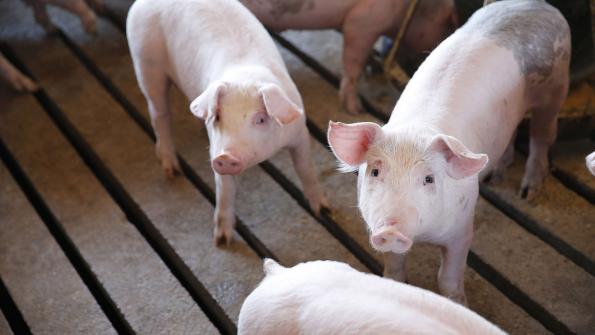Holding back hogs after Smithfield COVID-19 closure
Producers making changes to feed rations; searching for shackle space at other plants.

Marv Van Den Top has been in the hog business for 35 years and for the last 20, the Boyden, Iowa, pork producer has been sending those hogs 50 miles down the road to the Smithfield Foods Sioux Falls, S.D., plant. Now after Smithfield's announcement Sunday that it was closing its Sioux Falls plant indefinitely due to increasing employee COVID-19 cases there, Van Den Top has 4,000 head of fat hogs ready to go, with no place to send them.
"There's not a lot of options. Every other plant of course is full; other plants are having some issues as well as far as sickness of employees, so this isn't the only plant that has had issues," Van Den Top says. "Their kills are down, so the chances of them getting any of these excess hogs isn't looking very good at this point but we will have to see."
During a typical week, Van Den Top markets 1,500 head a week, but since kills were already down at the plant due to labor illness, he was banking on four loads this week and more the following. Now he is trying to keep those hogs at status quo, while he waits to hear if there are any alternative plants that will take them.
"We changed the feed rations and are starting to slow them down and hold them. If they don't gain much weight at all, and we'd like it if we could keep them to the point where they don't gain anything, but at best, two weeks would be the outside before I guess we'd have to make some real difficult decisions," Van Den Top says. "Of course, other pigs are coming up the pipeline, so what do you do with those? You can't keep holding them in the nurseries. They get bigger and bigger, and they get too full."
Prairie Queen Pork has also been making similar changes to their feeding program, adjusting feeder settings and reformulating diets. The Nunda, S.D., pork producers ship 80% of their hogs to the Sioux Falls Smithfield plant and will have 12,000 head ready to ship out over the next four weeks.
"We are giving them what they need nutritionally wise, but maybe giving them a lower energy diet, lower in the protein a little bit, to get them to slow down, especially the hogs that are getting close to ready that are going to be going out in the next six weeks," says co-owner Clint Overskei. "They're on a slowdown diet now. I would expect most of the industry is probably doing that as well — the ones that were affected by the Sioux Falls shutdown anyway. But you know we're only buying maybe a week or so, and we can't keep them that way forever."
Since Sunday's announcement, Overskei has busy been calling other plants, including Wholestone in Fremont, Neb., that takes the other 20% of their hogs. All are running at full capacity and don't have room to absorb more.
Overskei says it is to be expected, especially with labor shortages and processing lines slowing down due to COVID-19, but he hopes the industry is working on some protocols for shutting down plants and bringing them back online in a timely manner.
"We'd be fools to think that this is the last plant where this is going to happen," Overskei says. "You know, if it starts happening, if it's Worthington next week, Marshalltown next week after that, that's going to start affecting the grocery store shelves in pretty short order."
While both producers hope the Smithfield plant will reopen in the near future, Van Den Top recognizes Smithfield was "caught between a rock and a hard place" in making the decision.
"I thought '98 was bad, but this is starting to stack up to make that look like a cake walk," Van Den Top says. "This is unprecedented, and I don't think anyone saw this coming. I sure did not, I guess not to this extent."
Note: Overskei is a cousin-in-law to National Hog Farmer Editor Ann Hess.
About the Author(s)
You May Also Like





